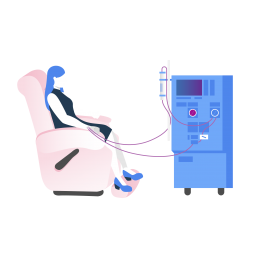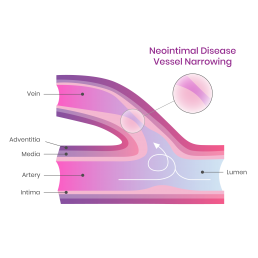
The Problem
Patients with chronic kidney disease who end up with kidney failure usually need dialysis treatments three times a week, in order to remove waste from the blood, regulate blood pressure and keep them alive. Patients are connected to dialysis machine through a surgically created vascular access, using the patient’s native veins (fistula) or artificial material (graft).
Both fistulas and grafts have a high propensity to fail due to the high blood flow through the vascular access. The high blood flow stresses and stretches the vascular access and results in an inflammatory response. This reactive process leads to neointimal disease that narrows the vessel lumen. Currently, there is no drug that can cure or prevent neointimal disease.



Turbulent Flow and Fistula Failure
Neointimal hyperplasia occurs when smooth muscle cells migrate to the innermost layer of the blood vessel (the intima) and multiply, which causes thicker vessel walls, decreased lumen space, and will eventually completely obstruct the vessel.
The only current solution is surgical intervention, balloon angioplasty — an expensive, painful, and highly invasive procedure that only temporarily opens up the vessel. Unfortunately, surgical intervention can further stress and damage to the vessel wall. Ultimately, the chronic injury to the vessel wall is so extensive that surgery can no longer be performed and the access is lost.
Our Solution
A team of world-renowned scientists and Nephrologists founded Vasocure to solve this problem. Our senior scientists were the first to discover the F11 receptor in humans. After 20 years of research to perfect the science, we found that activated smooth muscle cells express F11 receptor and blocking the F11 receptor slows smooth muscle cells proliferation and migration significantly. We developed Pedifin, our patented, game-changing therapeutic, as a blocker of the F11 receptor to prevent and treat neointimal disease.
How Pedifin Works
Pedifin targets the F11 receptor, competitively binds to its active domain and blocks signal transduction through the integrin pathway that causes muscle cells to migrate to the intima and proliferate. We have shown that Pedifin significantly reverses neointimal disease and atherosclerotic plaque formation in animal models, returning vessel function without any surgical intervention. This is a drug with potential to save millions of dialysis vascular accesses across the globe.